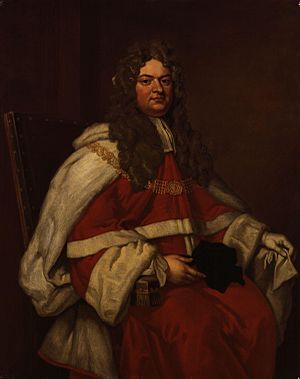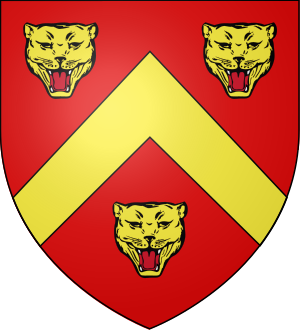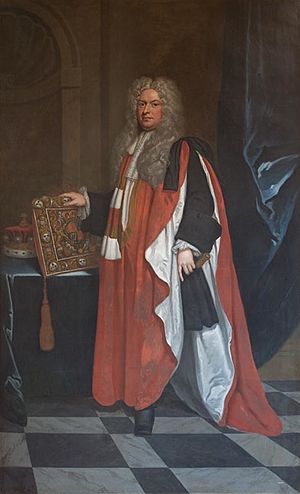Thomas Parker, 1st Earl of Macclesfield facts for kids
Quick facts for kids
The Earl of Macclesfield
|
|
|---|---|

Portrait after Sir Godfrey Kneller (1712).
|
|
| Lord High Chancellor of Great Britain | |
| In office 12 May 1718 – 7 January 1725 |
|
| Monarch | George I |
| Prime Minister | Sir Robert Walpole (1721–1725) |
| Preceded by | In Commission |
| Succeeded by | In Commission |
| Personal details | |
| Born | 23 July 1666 Staffordshire, England |
| Died | 28 April 1732 (aged 65) |
| Occupation | Politician |
Thomas Parker, 1st Earl of Macclesfield (born 23 July 1666 – died 28 April 1732) was an English politician. He was a member of the Whig party. He served in the House of Commons from 1705 to 1710.
Later, he became the Lord Chief Justice from 1710 to 1718. He also briefly acted as one of the regents before King George I arrived in Britain. His career ended when he was found to have handled money improperly. He spent his later years at his home, Shirburn Castle in Oxfordshire.
Contents
Early Life and Education
Thomas Parker was born in Staffordshire, England. His father, also named Thomas Parker, was a lawyer in Leek. His mother was Anne Venables.
He went to Adams' Grammar School and Derby School. In 1684, he began studying law at Inner Temple. He also attended Trinity College, Cambridge.
In 1691, he married Janet Carrier. They had two children:
- Lady Elizabeth Parker (died 1747)
- George Parker, 2nd Earl of Macclesfield (around 1697 – 1764)
Thomas Parker became a lawyer in 1694.
Start of Political Career
In 1705, Thomas Parker was elected as a Member of Parliament for Derby. He was part of the Whig party. That same year, he was made a King's Counsel (QC) and a serjeant-at-law. He was also knighted.
He was re-elected for Derby in 1708. As a leading Whig lawyer, he was involved in important legal cases. In 1710, he became the Lord Chief Justice. This meant he left his seat in the House of Commons.
Lord Chief Justice Role
From 1710 to 1718, Parker served as Lord Chief Justice. This was a very important legal position. He supported the Whig party's views.
When Queen Anne died in 1714, King George I was in Hanover. Thomas Parker was chosen as one of the people to govern Britain until the new King arrived. King George I was grateful for his support.
In 1716, King George I made him a noble, giving him the title Baron Parker of Macclesfield. That same year, he bought and began to fix up Shirburn Castle in Oxfordshire. This castle became the family home for many years. In 1718, because the King could not speak English well, Parker read the King's Speech in the House of Lords.
Becoming Lord Chancellor
In 1718, Thomas Parker became the Lord Chancellor. This is a very high legal and political position in Britain. He was also given a pension for life.
In 1721, he received an even higher title. He became the Earl of Macclesfield and Viscount Parker.
Later Life and Retirement
In 1724, there were concerns about how Thomas Parker had managed money. He left his role as Lord High Chancellor of Great Britain in 1725.
He was later tried by the House of Lords. He was found to have handled money improperly. He had to pay a large fine and was held in the Tower of London until the fine was paid. He was also removed from the Privy Council.
After this, he spent most of his life retired at Shirburn Castle. He passed away in London on 28 April 1732 and was buried at Shirburn.
Thomas Parker was elected a Fellow of the Royal Society in 1713. He was a friend of famous people like Sir Isaac Newton. He also supported a grammar school in his hometown of Leek.
 | James Van Der Zee |
 | Alma Thomas |
 | Ellis Wilson |
 | Margaret Taylor-Burroughs |



